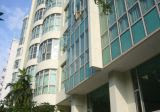AIRASIA, Asia’s largest budget airline by fleet size, reported sharply higher quarterly earnings as dwindling demand for full-fare carriers amid the economic downturn boosted discount airlines.
Regional budget carriers such as AirAsia and Jetstar Asia Airways, partly owned by Australia’s Qantas Airways Ltd, and Tiger Airways, 49 per cent owned by Singapore Airlines, have either added capacity or increased flight frequencies to cope with higher demand.
“While major legacy carriers are cutting flights, grounding planes, retrenching staff and reporting massive losses, AirAsia is seeing rising demand, adding more routes, increasing frequency and securing higher profits,” Tony Fernandes, AirAsia’s chief executive, said in a statement today.
Underlying passenger demand in the third quarter remains positive based on forward booking trends, he said.
Full-service carrier Malaysia Airlines said last week it returned to profitability in the second quarter, boosted by revaluation gains from fuel hedging, but still made losses at the operating level.
Lower fuel costs are helping AirAsia, which doesn’t hedge its fuel requirements.
Prices for jet fuel in Singapore have dropped more than 50 per cent after peaking at US$$167.70 a barrel last year.
But data from the International Air Transport Association showed conditions remained tough, with airlines carrying 16.5 per cent less cargo and 7.2 per cent fewer people in June than the same month a year ago.
AirAsia made a net profit of RM139.2 million in the April-June quarter against RM9.4 million a year earlier.
The airline maintained its seat load factor at 75 per cent during the quarter, a 5 percentage points increase over the first quarter.
Non-ticket revenue grew by 89 per cent to RM95 million in the second quarter, representing 14.5 per cent of total revenue, it said.
Analysts in Malaysia do not provide quarterly forecasts, but have said AirAsia’s tight cash flow and high debt level are worrying given its huge commitment to fund aircraft deliveries.
The airline recently announced plans to raise about $170-$180 million through private placements to repay borrowings.
It last week deferred the delivery of eight Airbus A320 aircraft to 2014 from 2010, which analysts said signals potential overcapacity in the future.
AirAsia shares have gained 64 per cent since the start of the year, far outperforming a rise of only 2.3 per cent by Malaysia Airlines and the broader market’s 35 per cent gain. - Reuters
Subscribe to:
Post Comments (Atom)



No comments:
Post a Comment